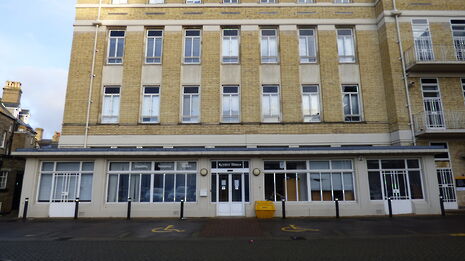Unequal access to education for disabled students an ‘institutional failure’, CUSU report finds
The report found that disabled students’ experiences around the distribution of their support documents was not just insufficient, but “actively negative”

CUSU has released a report citing the “substantial disadvantage” at which disabled students are placed, where teaching staff are often uninformed on the needs of individual students, who are then forced to “self-advocate."
The report has said that there has been in Cambridge “an institutional failure to adhere to the equality duty in proactively ensuring parity for reasonable adjustments."
The report has urged an investigation into “possible systems of accountability” on departmental, collegiate, and University-wide levels, so that disabled students “have clear routes to raise concerns and [to] ensure that they do not fall through the cracks."
It has also recommended “comprehensive training” to staff on the existing measures in place for disabled students, as well as a greater commitment of central resources toward implementing practical changes to the system.
Compiled by CUSU Disabled Students’ Officer Emrys Travis and Matt Kite, CUSU Education Officer, the report collected data on the experiences of disabled students in seeking academic adjustments with the goal of “ensur[ing] that the burden is not placed upon disabled individuals to overcome barriers placed in their way."
Under the terms of the 2010 Equality Act, Cambridge is mandated to make ‘reasonable adjustments’ for disabled students, such as providing extra time on examinations or recorded lectures, to counteract any impairments which put disabled students at an educational disadvantage.
Disabled students constitute over 15% of the student population at Cambridge – above the national average of 12%. Between 2008 and 2019, the number of self-identifying disabled students studying at Cambridge rose from 600 to 3,200.
According to the report, this increase has not been “matched by an effective concurrent commitment of resources to establishing, reviewing, and improving provisions for disabled students so as to ensure parity regarding opportunity."
A Varsity investigation in 2018 found the DRC faces significant challenges, likely as a result of a major rise in demand for the service overburdening comparatively few employees, leading to slow response times to inconsistent service provision.
The report found that “existing work” led by the DRC has started the “difficult but necessary culture change away from an individualised ‘case-by-case’ model” towards a “structurally inclusive ethos” of teaching and learning.
CUSU’s report, which used data from 109 completed student responses to surveys circulated in 2018, found that 73% of students had positive experiences with the exam adjustments application system, and that the reported negative experiences “point to improvements that should be made within the existing system, but not to the need for a complete system overhaul."
By contrast, it found that the current Student Support Document (SSD) system “is failing disabled students." An SSD is a written summary of recommendations for supporting and teaching an individual disabled student.
CUSU’s report cited that 71% of students had average-to-negative experiences with their distribution of SSD, and that 44% of 64 teaching staff respondents had never heard of an SSD.
The report found that in this area, “reasonable adjustments are not being made”, and that when supervisors and lecturers are not provided with SSDs, “students are forced to self-advocate."
It also found that “inclusive teaching and learning principles being embedded at the top levels of educational policy in the University are not yet being felt by students," as well as disparities across departments in existing inclusive practices. Furthermore, it found that of 64 teaching staff surveyed, 12% felt “comprehensively informed” about the needs of disabled students, while 60% felt “mostly or entirely uninformed."
CUSU’s 2016-2017 Big Cambridge Survey found that 47% of disabled undergraduates felt that reasonable adjustments were “consistently” made for them, and that 55% felt there was enough structure in their courses to allow them to work “effectively." Only 28% of surveyed disabled undergraduates reported that their workload was manageable and healthy, in comparison to 44% overall, and 71% of disabled students reported that Cambridge has had a negative impact on their mental health, compared to 44% of all students.
A University spokesperson told Varsity that “many of the issues raised in the report are seated in the University’s success in attracting applications from disabled students and admitting them in even larger numbers," citing the “strain” this has placed on existing support systems.
In an open meeting earlier this week, Senior Pro-Vice Chancellor for Education Graham Virgo agreed with students that the Disability Resource Centre is currently underfunded.
They added: “At present the process is complex. After the document is signed off by the student it is forwarded to agreed contacts across the University, in different colleges, faculties and departments. These contacts then need to distribute the document onwards – as agreed by the student – to everyone who plays a role in the student’s academic life, including supervisors, librarians and lecturers. Ensuring we meet GDPR compliance has made the process even more complex.”
They added that “it is clear that reasonable adjustments are being made for disabled students but that the process is inconsistent," and that they “encourage” staff to look at ‘The Code of Practice: Reasonable Adjustments for Disabled Students’ “and take advantage of the training on offer where needed."
The report has urged “support for the bid for resources to systematise SSD production and distribution via inclusion in existing central digital systems." It encourages commitment from the collegiate University to “clearer, more frequent, and more transparent communication” so that the adjustment application and implementation processes are “advertised and demystified."
It calls on the Examinations and Assessment Committee to review the medical evidence students must provide in asking for exam adjustments, and “whether there is parity in how this is understood across support staff on a college level."
The report has also recommended the creation of a Reasonable Adjustments Working Group at a University level, to “bridge the institutional gap in responsibility between the immediate short term future and the longer term goals of inclusive teaching and learning practices."
The University spokesperson said: “The DRC and the Cambridge Centre for Teaching and Learning are currently working on the development of new online training for teaching staff to ensure they are equipped to support disabled students,” and that it will “take some time” for pilot schemes such as Lecture Capture to be operating efficiently enough to be introduced more widely.
The report stated that “the University must recognise the overwhelming disparity in full and equal access to education currently being experienced by disabled students, and act accordingly.”
CUSU and GU are holding an Academic Reasonable Adjustments Forum on the 21st March, from 11am to 1pm to “discuss and begin making steps towards” a “more systematised model” of reasonable adjustments in teaching and learning.
 News / Hundreds of Cambridge academics demand vote on fate of vet course20 February 2026
News / Hundreds of Cambridge academics demand vote on fate of vet course20 February 2026 News / Judge Business School advisor resigns over Epstein and Andrew links18 February 2026
News / Judge Business School advisor resigns over Epstein and Andrew links18 February 2026 News / University Council rescinds University Centre membership20 February 2026
News / University Council rescinds University Centre membership20 February 2026 News / Petition demands University reverse decision on vegan menu20 February 2026
News / Petition demands University reverse decision on vegan menu20 February 2026 News / Caius students fail to pass Pride flag proposal20 February 2026
News / Caius students fail to pass Pride flag proposal20 February 2026










